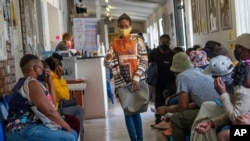ປະເທດ ອາຟຣິກາໃຕ້ ໄດ້ຢຸດການສັກຢາ COVID-19 ຂອງເຂົາເຈົ້າຊົ່ວຄາວໃນວັນອາທິດວານນີ້ ຫຼັງຈາກການສຶກສາຄັ້ງໃໝ່ໄດ້ສະແດງໃຫ້ເຫັນວ່າຢາວັກຊີນຂອງບໍລິສັດ AstraZeneca ແມ່ນດ້ອຍປະສິດທີຜົນຕໍ່ໄວຣັສ ທີ່ປ່ຽນແປງໃໝ່ທີ່ຖືກພົບເຫັນໃນປະເທດນັ້ນ.
ການສຶກສາດັ່ງກ່າວ, ເຊິ່ງດຳເນີນໂດຍມະຫາວິທະຍາໄລ ວິດວໍເທີສແຣນ (Witwatersrand) ໃນນະຄອນຫຼວງ ໂຈແຮນເນັສເບີກ ແລະ ຍັງບໍ່ໄດ້ຖືກປະເມີນທາງວິທະຍາສາດເທື່ອນັ້ນ, ໄດ້ສະຫຼຸບວ່າຢາວັກຊີນຂອງ ອັງກິດ ໄດ້ໃຫ້ “ການປົກປ້ອງຢ່າງຈຳກັດ” ຕໍ່ໂຣກທີ່ມີຮູບແບບໃໝ່ທີ່ມີສາເຫດມາຈາກໄວຣັສທີ່ໄດ້ປ່ຽນແປງໃນ ອາຟຣິກາໃຕ້ ໃນຜູ້ໃຫຍ່ທີ່ຍັງໜຸ່ມ.”
ຂ່າວດັ່ງກ່າວໄດ້ເປັນຂ່າວບໍ່ດີຕໍ່ ອາຟຣິກາໃຕ້, ເຊິ່ງປະຊາຊົນຫຼາຍກວ່າ 46,000 ຄົນໄດ້ເສຍຊີວິດຍ້ອນໄວຣັສດັ່ງກ່າວ. ເຂົາເຈົ້າມີແຜນທີ່ຈະສັກຢາໃຫ້ປະຊົນຂອງເຂົາເຈົ້າດ້ວຍຢາວັກຊີນຂອງບໍລິ ສັດ AstraZeneca ນຶ່ງລ້ານໂດສໃນບໍ່ເທົ່າໃດວັນຂ້າງໜ້ານີ້. ແຕ່ການສຶກສາໄດ້ພົບວ່າວັກຊີນດັ່ງກ່າວມີປະສິດທິຜົນພຽງ 22 ເປີເຊັນ ໃນກໍລະນີທີ່ບໍ່ຮຸນແຮງຂອງໂຣກທີ່ປ່ຽນແປງໃໝ່ໃນ ອາຟຣິກາໃຕ້.
ການສຶກສາບໍ່ໄດ້ຄົ້ນຫາຜົນກະທົບຂອງວັກຊີນຕໍ່ກໍລະນີທີ່ຮຸນແຮງ. ໄວຮັສທີ່ປ່ຽນແປງໃໝ່ນັ້ນໄດ້ຖືກພົບເຫັນໃນຢ່າງໜ້ອຍ 32 ປະເທດລວມທັງ ສະຫະລັດ.
ບໍລິສັດ AstraZeneca ໄດ້ກ່າວໃນວັນອາທິດວານນີ້ວ່າ ເຂົາເຈົ້າກຳລັງພັດທະນາຢາວັກຊີນອີກຊະນິດນຶ່ງທີ່ຈະມີປະສິດທິພາບກວ່າເກົ່າຕໍ່ໄວຣັສທີ່ປ່ຽນແປງໃໝ່ໃນ ອາຟຣິກາໃຕ້, ເຊິ່ງຄາດວ່າຈະອອກມາພາຍໃນລະດູໃບໄມ້ຫຼົ່ນນີ້.
ໃນທ້າຍອາທິດທີ່ຜ່ານມາ, ທັງ ອີຣ່ານ ແລະ ຈີນ ໄດ້ເປີດຕົວຢາວັກຊີນຕໍ່ຕ້ານໄວຣັສຊະນິດໃໝ່. ໃນວັນອາທິດ, ອີຣ່ານ ໄດ້ປະກາດວ່າເຂົາເຈົ້າໄດ້ພັດທະນາຢາວັກຊີນ ຣາຊີ ຄອຟ ພາສ໌ ເຊິ່ງຖືກຜະລິດໂດຍບໍລິສັດຢາວັກຊີນ ຣາຊີ ແລະ ສະຖາບັນຄົ້ນຄວ້າ ຊີຣຳ. ບັນດານັກວິທະຍາສາດຈະເລີ່ມການທົດລອງຢາວັກຊີນນັ້ນກັບປະຊາຊົນໃນອາທິດນີ້.
ໃນວັນເສົາທີ່ຜ່ານມາ, ອົງການບໍລິຫານຜະລິດຕະພັນທາງການແພດແຫ່ງຊາດຂອງ ຈີນ ໄດ້ກ່າວໃນຖະແຫຼງການສະບັບນຶ່ງວ່າ ບັນດາຜູ້ອອກກົດລະບຽບໄດ້ອະນຸມັດການໃຊ້ຢາ CoronaVac ໃນວັນສຸກອາທິດແລ້ວນີ້, ເຊິ່ງຖືກພັດທະນາຂຶ້ນໂດຍບໍລິສັດ ຊີໂນແວັກ ໄບໂອເທັກ ຈຳກັດ.
ມັນເປັນຢາວັກຊີນຊະນິດທີສອງ ທີ່ຖືກອະນຸມັດສຳລັບການໃຊ້ໃນສາທາລະນະໃນປະເທດທີ່ຕັ້ງຢູ່ເອເຊຍຕາເວັນອອກນັ້ນ. ຊະນິດທຳອິດ, ເປັນວັກຊີນທີ່ຖືກພັດທະນາຂຶ້ນໂດຍສະຖາບັນ ຈີນ ທີ່ຮ່ວມມືກັບກຸ່ມເພສັດສະກຳແຫ່ງຊາດ ຈີນ, ຊີໂນຟາມ, ທີ່ໄດ້ຮັບການອະນຸມັດໃຊ້ເມື່ອສອງເດືອນທີ່ຜ່ານມາ.
South Africa suspended its vaccination campaign against COVID-19 Sunday after a new study revealed that the AstraZeneca vaccine is less effective against a variant of the virus found in the country.
The study, conducted by the University of the Witwatersrand in Johannesburg and not yet peer reviewed, concluded that the British vaccine offered only "limited protection against moderate forms of the disease caused by the South African variant, in young adults."
The news was a blow to South Africa, which has seen more than 46,000 people die from the virus. It had planned to begin inoculating its population with a million doses of the AstraZeneca vaccine in the coming days. But the study found that the vaccine was only 22% effective in moderate cases of the South African variant of the disease.
The study did not explore the vaccine’s effect against severe cases. The variant has been found in at least 32 other countries including the United States.
AstraZeneca said Sunday it was developing another vaccine that would be more effective against the South African variant, which could be expected by this autumn.
Over the weekend, both Iran and China unveiled new vaccines against the virus. On Sunday, Iran announced it had developed the Razi Cov Pars vaccine manufactured by the Razi Vaccine and Serum Research Institute. Scientists will begin testing the vaccine on people this week.
On Saturday, China’s National Medical Products Administration said in a statement Saturday that regulators approved the use Friday of CoronaVac, developed by Sinovac Biotech Ltd.
It’s the second vaccine approved for public use in the East Asian country. The first, a vaccine developed by a Chinese institute affiliated with the state-owned China National Pharmaceutical Group, Sinopharm, was approved two months ago.




